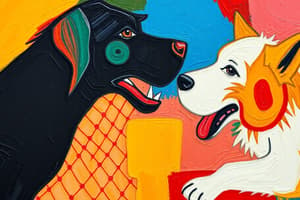Podcast
Questions and Answers
Which learning process occurs when the same response happens in reaction to many similar stimuli?
Which learning process occurs when the same response happens in reaction to many similar stimuli?
generalization
Which two stimuli did John B. Watson associate in his infamous 'Little Albert' experiment?
Which two stimuli did John B. Watson associate in his infamous 'Little Albert' experiment?
a white lab rat and a loud noise
Which of the following is considered a naturally occurring behavior that does not have to be learned?
Which of the following is considered a naturally occurring behavior that does not have to be learned?
- Conditioned response
- Learned behavior
- Unconditioned response (correct)
- Classical response
What is the conditioned stimulus (CS) in the scenario where each time Alvina cries, her parents give her a stuffed rabbit?
What is the conditioned stimulus (CS) in the scenario where each time Alvina cries, her parents give her a stuffed rabbit?
When Ivan Pavlov observed evidence of classical conditioning, he was studying the __________.
When Ivan Pavlov observed evidence of classical conditioning, he was studying the __________.
Which of the following represents the initial stage of learning in the process of conditioning?
Which of the following represents the initial stage of learning in the process of conditioning?
Describe the experiment in which Ivan Pavlov first confirmed the existence of classical conditioning.
Describe the experiment in which Ivan Pavlov first confirmed the existence of classical conditioning.
Explain why smokers may experience spontaneous recovery for craving a cigarette after they have quit smoking.
Explain why smokers may experience spontaneous recovery for craving a cigarette after they have quit smoking.
Classical conditioning has an effect only when the subject is not aware it is occurring.
Classical conditioning has an effect only when the subject is not aware it is occurring.
What did Pavlov initially notice about the animals in his original research after conditioning took place?
What did Pavlov initially notice about the animals in his original research after conditioning took place?
Flashcards are hidden until you start studying
Study Notes
Classical Conditioning
- Generalization occurs when the same response is elicited by stimuli that are similar in nature.
- In John B. Watson's "Little Albert" experiment, a white lab rat was paired with a loud noise, creating a conditioned response of fear.
- An unconditioned response is a naturally occurring behavior that does not require learning; it is instinctive.
- In a scenario with parents Molly and Mark, the conditioned stimulus is the stuffed rabbit, as their daughter associates it with discomfort after her parents' response to her crying.
- Ivan Pavlov's studies focused on the digestive processes of dogs, which led to the discovery of classical conditioning.
- Acquisition represents the initial stage in the conditioning process where the association between the stimulus and response is formed.
- Pavlov's landmark experiment demonstrated classical conditioning by pairing a neutral stimulus (bell) with an unconditioned stimulus (food) to elicit a conditioned response (salivation).
- Smokers may experience spontaneous recovery of cravings after quitting due to environmental triggers that evoke prior associations formed during smoking.
- The statement that classical conditioning only happens when the subject is unaware is false; awareness can occur in conditioned learning.
- Post-conditioning, Pavlov observed that dogs salivated even in the absence of food, indicating that the bell had become an effective conditioned stimulus.
Studying That Suits You
Use AI to generate personalized quizzes and flashcards to suit your learning preferences.




